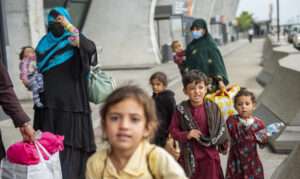The Volokh Conspiracy
Mostly law professors | Sometimes contrarian | Often libertarian | Always independent
Trump's Unjust and Counterproductive Collective Punishment of Afghan Migrants
Stopping all immigration processing for Afghan migrants is unjust and undermines rather than furthers the goal of combatting terrorism.

Yesterday, Afghan migrant Rahmanullah Lakanwal shot and seriously wounded two National Guard members in Washington, DC. In response, the Trump Administration has "indefinitely" suspended processing of all immigration-related applications by Afghans, including those legally in the US already. The Trump Administration has already been trying to deport many recent Afghan migrants, and this attack may serve a convenient excuse for further actions along these lines.
Lakanwal's attack was a heinous crime, and he should be prosecuted to the fullest extent of the law. But Trump's collective punishment of Afghan immigrants is both unjust and counterproductive. As a group, Afghan immigrants have a very low rate of terrorism. Moreover, many entered the United States precisely because they helped the US in the war against the Taliban and Al Qaeda. Barring or deporting such people will predictably undermine future efforts to combat terrorism.
My Cato Institute colleague Alex Nowrasteh, a leading expert on immigration and terrorism (author of the most comprehensive analysis of that subject), has a helpful post listing all Afghan migrants who committed or attempted to commit terrorist attacks in the US, from 1975 to 2024. There are a total of only six, none of whom caused any fatalities. If, as seems likely, Lakanwal's attack was motivated by terrorism, that would make seven. That's a very low rate (about one perpetrator every seven years) for an immigrant community that numbers some 200,000 people.
If Lakanwal's crime turns out to be a terrorist attack, it would be only the second attempted by one of the large number of Afghan migrants who entered since 2021, after the fall of Afghanistan to the Taliban (the earlier case was this one). If, as the administration claims, the 2021 influx included large numbers of unvetted terrorists, we should be seeing a lot more incidents like these.
The overall rate of terrorism among Afghan migrants may well be lower than that among native-born Americans. Since 2020, domestic right-wing perpetrators of political violence (nearly all native-born whites) have killed 44 people, and likely committed many more non-fatal attacks, though the exact number is hard to pin down. Left-wing domestic terrorists accounted for another 18 deaths during the same period (they, too, probably committed many additional non-fatal attacks). That's likely a higher incidence of terrorism than Afghan migrants, even accounting for the latter's much smaller numbers. Exact comparisons are difficult because we don't have a comprehensive data base of non-fatal domestic terrorist incidents.
Conservatives rightly decry racial and ethnic discrimination by government in other contexts, for example when it comes to racial preferences in employment and education. These principles should apply to immigration, as well. There is no justification for collectively sanctioning all Afghan migrants for the aberrational acts of very small number of them. All the more so in a situation where deportation and exclusion would subject victims to the horrifically oppressive rule of the Taliban. That's far worse than, e.g., being unfairly denied admission to an elite college, and having to settle for a lower-ranking one.
In the case of the Afghans, deportation and exclusion may well actively undermine the struggle against terrorism, rather than further it. I explained why in an earlier post about Trump's efforts to deport Afghans who arrived since 2021:
The veterans' groups [opposing deportation of Afghans] are right. Afghans deported back to Afghanistan - especially those who worked with the US during the war - will indeed face harsh persecution by the Taliban. Deporting them would be profoundly unjust, and also a betrayal of wartime allies that will make it more difficult for the US to recruit local support in any future conflict. If we don't stand by our allies, why would anyone trust us?
I'm old enough to remember a time when Republicans saw themselves as fighters against radical Islamism. Now they seek to deport Afghan allies back to the tender mercies of the Taliban, under the ludicrous pretext that conditions in Afghanistan are improving under the Taliban's rule.
If we betray Afghans who helped us fight terrorism, based on indefensible ethnic prejudice, potential allies will be less likely to help us in future conflicts.
NOTE: To forestall misunderstandings, I will point out I am using the word "punishment" here in its colloquial sense, covering all retaliatory punitive actions, rather than in the technical legal sense, which only covers penal sanctions imposed after conviction for a crime. The administration's actions against Afghan migrants fit the former definition, even if not the latter.


Show Comments (90)